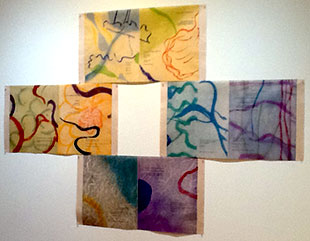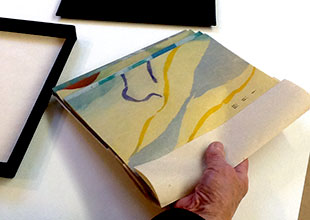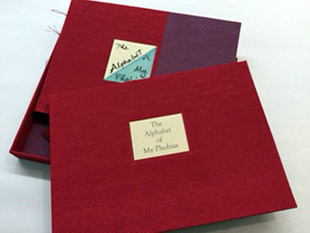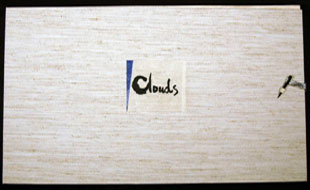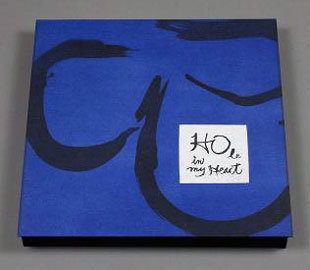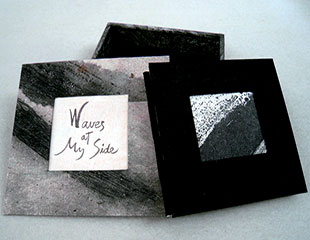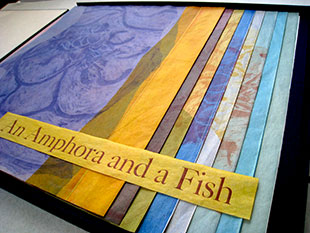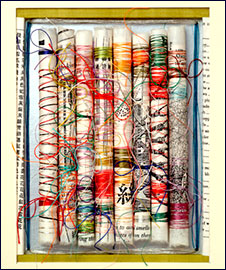
|
Kumi Korf ~New York |
Share this page: |
|
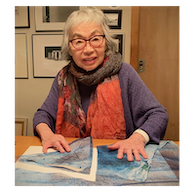 |
Kumi Korf: "It is a magic moment, each time when the dampened paper is peeled off from the plate, revealing the transferred image from plate to paper. I love the surface of the copper plate, polished, worked, inked, and wiped. My technique of intaglio printing is traditional, however the experience is more like painting than printing for me."
|
|
Delirium
Rebecca Rafferty, The Visual Artworker, July 24, 2014: "Kumi's prints are biomorphic abstractions — gentle curves and attractive color which she develops intuitively in series — one thing leads to another. Her art creates a field for a poem written by Bhisham Bherwani." |
|
|
The Alphabet of My Phobias Size: book cover – 8.1 x 11.375x .75" closed; book -7.5" x 11" closed, 7.5" x 25" extended; box - 8.5 x 12 x 1.25" closed. Materials: Akatosashi paper, Masa waxed paper, Denril, Stainless steel wire, silk thread and book cloth. Techniques: intaglio prints and silk screen printing. Text set and silk-screened in Garamond typeface by Roberto Silva Ortiz. Intaglio prints by Kumi Korf at Printmaking Center in Ithaca. Binding: Accordion Pleats, stepped. Pages were sewn into valleys of accordion folds with pamphlet stitching. Concept, design and binding by Kumi Korf. Numbered. "The Alphabet of My Phobias" features verses by Maia Vidal from her CD God is My Bike (2011). Each page is a triangle that folds out to reveal the meaning for that letter of the alphabet. The introductory verse by Vidal lets the reader know that this is not necessarily going to be a fun and happy reading - alphabetically speaking. "I want to write a song about the words that I cut out of my verbal repertoire." She gives us "words I cannot say in hopes they go away" such as Abortion and Climate Change. The accordion fold allows the pages to be pulled out into a longer visual panorama of letters, paper, and color. |
||
| Clouds By Kumi Korf Ithaca, New York: Rikka Press, 2010. Edition of 6. 17 x 8.75 x .5"; 16 pages. Expandable codex. Intaglio prints. Materials: Hahnemühle Copperplate paper, Masa waxed paper, Denril vellum, stainless steel wire, and dental floss. Accordion-fold spine composed of Masa waxed paper and reinforced by Denril vellum. Bound with dental floss and fortified by stainless steel wire. Housed in a hinged linen box with bone clasp closure and title label tipped on top. Kumi Korf: "This is the second book in which I used a structure I invented. Accordion folds hold each page, attached with dental floss, three holes on the page, with stainless steel wire on the backside of each fold as reinforcement. The accordion folds are not equally dimensioned. There is 1/2" difference, allowing a half-inch of the page edges to show when the book is closed. Different colors line up like stripes or folds of clothing similar to the formal attire of court ladies in Japan thousands of years ago. The pages are printed on both sides by intaglio techniques. "We look up at clouds all the time. They are, visually, so much a part of our daily life. One artist that comes to mind is Constable. His studies of clouds are almost abstract paintings. Clouds are shapely but abstract." $1,800 |
||
Hole in my Heart Marjorie Olds, "Hidden Books - Kumi Korf puts her feelings down on paper," The Ithaca Times: "When we discussed what is hidden from view in Korf's work, she described how what we feel and what we see are inextricably bound together: One of her artists' books, Hole in My Heart, is based on poems written by women in the ninth and tenth centuries. Many of the stories are woven into sad love songs. The book appears to have a hole in its center an that reflects the sadness in the heart of the poets, who nonetheless, despite their sorrows, went on to create the poems we still read." Artist’s Books Unshelved: Hearts Unbound |
||
Waves at My Side 6" x 6" x .75" closed. Intaglio prints cut and folded to form an accordion book. Lithograph cover print. Masa waxed paper backing. Cloth covered boards. Housed in matching lidded box. Signed and numbered by the artist. Kumi Korf: “’Waves on my Side’ is an accordion-pleated book, with intaglio prints on Japanese paper. The pages are images of waves on one side, when unfolded, and of railroad tracks on the other. “The piece is inspired by my childhood memories of riding the train alongside a huge cliff at the edge of the Japan Sea. The crashing waves coming close to the tall bluff felt precarious; as a child, needing to trust that the world around must be safe, I felt a foreboding of tragedy. The sea, the cliff, the locomotive with its black smoke, white steam, and shrieking whistles formed a strong memory.” |
||
| Kumi Korf SOLD / Out of Print Titles: | ||
An Amphora and a Fish 20.5 x 24.25 x 1.25"; 7 pages. Intaglio plates printed on Akatosashi paper. Letterpress. Japanese papers. Text printed by Blacks Corner Letterpress. Binding designed and executed by the artist. An original story by Kumi Korf accompanied by her illustrations in intaglio. Kumi Korf: "The visual experiences that move me, color, composition, and luminosity, are in nature around me. I feel that I am grounded in observation of it. I hope that the translation of what I observe turns into color, shapes, and brush strokes, and it is my wish to evoke the spiritual through the visual." Mark Dimunation (Chief of the Rare Book and Special Collections Division, Library of Congress): "Kumi Korf’s artists’ books are not only concerned with structure, but also with printmaking and the relationship of illustration to text. They are extremely complicated, very rich. I feel they are good representations of a certain kind of work that’s being done in America. So that’s why her particular books have been added to the Library of Congress. "Her books have interesting elements of construction, questioning how a book operates, but more importantly and I think most expressively of Kumi is the intense quality of the prints. They are both an important aspect of her Japanese background, but they’re being done in a very modern American way. Her prints tell the story, but they also move you through the book. And because many of her prints are large, and broken up, they have an abstract level to them that reads as a very modern American book. They document the Book Arts movement in America on many different levels." |
||
Silk and Secrecy
(SOLD/Out of Print) |
||
Page last update: 11.22.2024
Home | About Us | Contact Us | New Arrivals | Fine Press & Artists' Books | Broadsides |Resource Books | Order/Inquiry
Copyright © 2021 Vamp & Tramp, Booksellers, LLC. All rights reserved.
